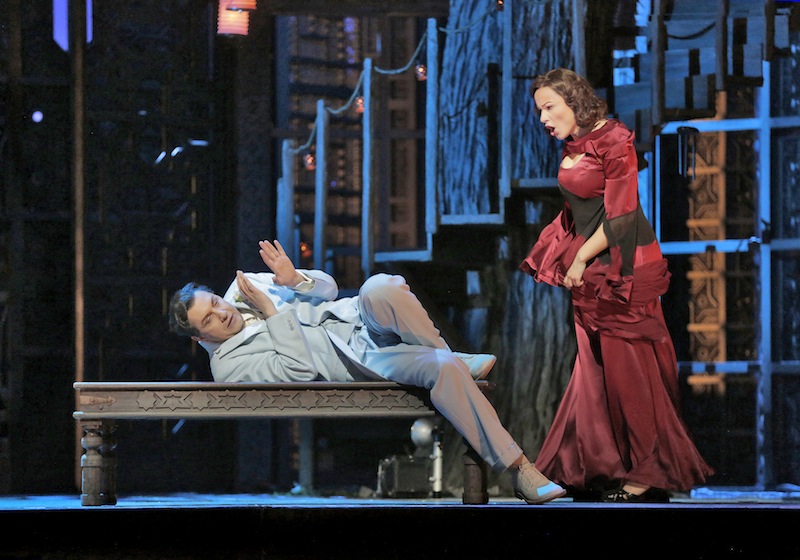Strong cast makes Met’s “Figaro” sparkle anew

Mikhail Petrenko as Figaro and Anita Hartig as Susanna in Mozart’s “Le Nozze di Figaro” at the Metropolitan Opera. Photo: Ken Howard
Without question, the Mozart–da Ponte collaboration of Le Nozze di Figaro is one of the greatest ensemble pieces ever written for the stage. And Thursday’s season premiere at the Metropolitan Opera, reviving Richard Eyre’s attractive inter-war staging from the 2014-15 season, featured a superb ensemble.
In a work that includes memorable music for nearly every character, a weak spot here and there won’t sink a performance. Thursday’s presentation was not flawless by any means—Mikhail Petrenko, as the bridegroom of the title sounded bare in most of his singing, and was especially exposed at the top of arias like “Se vuol ballare.” Isabel Leonard sounded just slightly uncomfortable in the upper reaches of Cherubino’s part, further suggesting that she might be growing out of roles that lean on the cool, light clarity of her upper register.
But these two, along with the rest of the company, were able to carry the performance through their collective commitment to the scenario. Even if his voice was not particularly welcoming, Petrenko’s amiable demeanor made him an instantly likable Figaro. Leonard was irresistibly charming in her scampish portrayal of the lovestruck young Cherubino, stealing every scene she walked into with her masterfully timed comic antics. The relationships among the characters were a joy to watch, particularly that between Susanna and Figaro, who seemed completely at ease with each other, clearly delighting in each other’s company. The performance featured uncommonly fresh acting for a season-old revival, for which credit is due to stage director Jonathon Loy.
Anita Hartig has yet to make a Met appearance in which she did not stand out, and as Susanna the Romanian soprano was simply radiant. She produces a consistently blooming sound, her tone beautifully and subtly colored, honey at its top and more caramel further down. Her rendition of “Deh vieni, non tardar,” floating out over the pit and effortlessly filling every corner of the auditorium, was the kind of soaring marvel that makes one envy the folks in the family circle. A committed actress to boot, it’s not hard to imagine Hartig enjoying a true star career at the Met in the near future.
Rachel Willis-Sørensen, reprising the role with which she made her 2014 debut, showed a pattern similar to her last outing as the Countess. In the sighing aria “Porgi amor,” she sang well but sounded less than fully settled, especially in her upper register. This could have been due to nerves, though it may also have been the staging, which has her reclining in a plush king-sized bed as she sings. At any rate, her middle voice was unimpeachable, full in body, amber in color—a strength that was even more evident in her beautiful, fully realized “Dove sono”in Act 3. She still sounded a little pinched on the piano repeat, but this aria, sung and acted with specificity of intention, encapsulated the quiet pain that Sørensen brought to her portrayal.
As her husband, the faithless Count Almaviva, Luca Pisaroni was as vocally solid as ever, the seamless richness of his voice emphasizing the role’s lyrical side. He seemed to be playing down the Casanova angle of the role, a departure from earlier runs of this production. The topless maid who scurries across the stage during the overture seems even more gratuitous as a result, but the choice gives the actor a little more room for nuance. His violent streak still elicits revulsion, to be sure, but it seems here to be born specifically of his possessive jealousy than a more generic brutishness.
As the musical leadership of the company gets steadily murkier, it has been interesting to watch the development of the Met’s principal conductor, Fabio Luisi. Once upon a time, it seemed he could be relied upon to deliver squeaky-clean performances that felt a little stiff. In the past couple of seasons, he has tended to sacrifice some of that polish to achieve more vigorous interpretations, and almost always the exchange has been more than worth it. Thursday was such an example: his tempos were remarkably brisk, and he played rough with the overture, which was uncommonly thrilling as a result. Though the ensemble tended to fray in larger scenes, such as the brilliant Act II finale, the sound of the music was sumptuous.
A strong supporting cast was led by the superb Maurizio Muraro, sporting an oaken barrel of a voice and demonstrating first-rate patter singing in his imperious “La vendetta.” Avoiding playing Dr. Bartolo as a goofy caricature, he acted more as a straight man to the comic bluster of Susanne Mentzer’s Marcellina. Ashley Emerson, with a lovely, sweet warble, made an assertively charming Barberina, and Thursday included a fine debut for Robert McPherson, who brought a bright tenor to his glib Don Basilio.
Above all, the entire company contributed to an enchanting performance that must surely have left every listener with a renewed admiration for the enduring genius of Figaro. What better recommendation is there?
Le Nozze di Figaro runs through March 26 at the Metropolitan Opera. Amanda Majeski assumes the role of the Countess beginning March 19. metopera.org